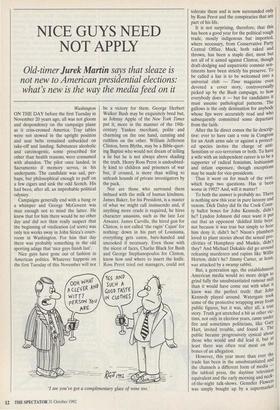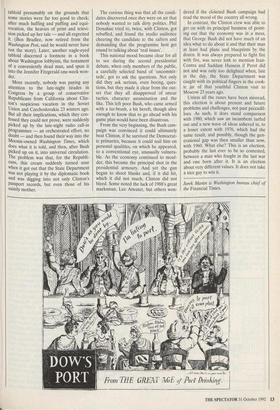NICE GUYS NEED NOT APPLY
Old-timer Jurek Martin says that sleaze is
not new to American presidential elections: what's new is the way the media feed on it
Campaigns generally end with a bang or a whimper and George McGovern was man enough not to mind the latter. He knew that for him there would be no other day and did not then really suspect that the beginning of vindication (of sorts) was only ten weeks away in John Sirica's court- room in Washington. For him that day there was probably something in the old sporting adage that 'nice guys finish last'.
Nice guys have gone out of fashion in American politics. Whatever happens on the first Tuesday of this November will not be a victory for them. George Herbert Walker Bush may be exquisitely bred but, as Johnny Apple of the New York Times put it, more in the manner of the 19th- century Yankee merchant, polite and charming on the one hand, cunning and ruthless on the other. William Jefferson Clinton, born Blythe, may be a Bible-quot- ing Baptist who would not dream of telling a lie but he is not always above shading the truth. Henry Ross Perot is undoubted- ly kind to children and prisoners of war but, if crossed, is more than willing to unleash hounds of private investigators by the pack.
Nor are those who surround them imbued with the milk of human kindness. James Baker, for his President, is a master of what we might call insinuendo and, if anything more crude is required, he hires character assassins, such as the late Lee Atwater. James Carville, the hired gun for Clinton, is not called 'the ragin' Cajun' for nothing: down in his part of Louisiana, everything gets eaten, bare-handed and uncooked if necessary. Even those with the nicest of faces, Charlie Black for Bush and George Stephanopoulos for Clinton, know how and where to insert the knife. Ross Perot tried out managers, could not 'I see you've got a complimentary glass of wine too.' tolerate them and is now surrounded only by Ross Perot and the conspiracies that are part of his life.
It is not surprising, therefore, that this has been a good year for the political rough trade, mostly indigenous but imported, where necessary, from Conservative Party Central Office. Muck, both raked and thrown, has been a staple diet, most but not all of it aimed against Clinton, though draft-dodging and unpatriotic commie sen- timents have been strictly his preserve. To be called a liar is to be welcomed into a universal club — Time magazine even devoted a cover story, controversially picked up by the Bush campaign, to how everybody does it — but for candidates it must assume pathological patterns. The gallows is the only destination for anybody whose lips were accurately read and who subsequently committed some departure from the faith.
After the lie direct comes the lie descrip- tive: ever to have cast a vote in Congress for an Arab arms sale or against a protect-
ed species invites the charge of anti- Semitism or eco-terrorism or both. To have a wife with an independent career is to be a supporter of radical feminism, lesbianism and infant exposure, though exceptions may be made for vice-presidents.
Thus it went on for much of the year which begs two questions. Has it been worse in 1992? And, will it matter?
To both the answer is probably no. There is nothing new this year in pure larceny and
venom. Dick Daley did fix the Cook Coun- ty ballot boxes for John Kennedy, didn't he? Lyndon Johnson did once want it put out that an opponent 'diddled little boys
not because it was true but simply to hear him deny it, didn't he? Nixon's plumbers loved to plant stories about the sexual pro- clivities of Humphrey and Muskie, didn't they? And Michael Dukakis did go around releasing murderers and rapists like Willie Horton, didn't he? Jimmy Carter, at least, was attacked by a swamp rabbit. But, a generation ago, the establishment American media would no more deign to grind fully the unsubstantiated rumour mill than it would have come out with what it knew was the perfect truth: that John Kennedy played around. Watergate took some of the protective wrapping away from public figures, but it was, after all, a true story. Truth got stretched a bit as other vic- tims, not only in election years, came under fire and sometimes politicians, like Gary Hart, invited trouble, and found it. The public became progressively cynical about those who would and did lead it, but at least there was often real meat on the bones of an allegation.
However, this year more than ever the trade has been in the unsubstantiated and the channels a different form of media the tabloid press, the daytime television equivalent and the early morning and neck- of-the-night talk-shows. Gennifer Flowers was simply bought up by a supermarket tabloid presumably on the grounds that some stories were far too good to check; after much huffing and puffing and equi- vocation, the heavies of print and televi- sion picked up her tale — and all regretted It. (Ben Bradlee, now retired from the Washington Post, said he would never have run the story). Later, another eagle-eyed tabloid discerned a footnote in a book about Washington lobbyists, the testament of a conveniently dead man, and spun it into the Jennifer Fitzgerald one-week won- der.
More recently, nobody was paying any attention to the late-night tirades in Congress by a group of conservative Republicans from California about Clin- ton's suspicious vacation in the Soviet Union and Czechoslovakia 23 winters ago. But all their implications, which they con- fessed they could not prove, were suddenly picked up by the late-night radio call-in programmes — an orchestrated effort, no doubt — and then found their way into the Moonie-owned Washington Times, which does what it is told, and then, after Bush picked up on it, into universal circulation. The problem was that, for the Republi- cans, this cream suddenly turned sour when it got out that the State Department was not playing it by the diplomatic book and was digging into not only Clinton's passport records, but even those of his saintly mother. The curious thing was that all the candi- dates discovered once they were on air that nobody wanted to talk dirty politics. Phil Donahue tried to, twice, with Clinton, got rebuffed, and found the studio audience cheering the candidate to the rafters and demanding that the programme host get round to talking about 'real issues'.
This national mood became clear for all to see during the second presidential debate, when only members of the public, a carefully selected band of `uncommit- teds', got to ask the questions. Not only did they ask serious, even boring, ques- tions, but they made it clear from the out- set that they all disapproved of smear tactics, character assassination and the like. This left poor Bush, who came armed with a tar-brush, a bit bereft, though alive enough to know that to go ahead with his game plan would have been disastrous.
From the very beginning, the Bush cam- paign was convinced it could ultimately beat Clinton, if he survived the Democrat- ic primaries, because it could nail him on personal qualities, on which he appeared, to a conventional eye, unusually vulnera- ble. As the economy continued to moul- der, this became the principal shot in the presidential armoury. And yet the gun began to shoot blanks and, if it did hit, which it did not much, Clinton did not bleed. Some noted the lack of 1988's great marksman, Lee Atwater, but others won- dered if the cloieted Bush campaign had read the mood of the country all wrong.
In contrast, the Clinton crew was able to get on with its principal business of point- ing out that the economy was in a mess, that George Bush did not have much of an idea what to do about it and that their man at least had plans and blueprints by the dozen. It was always prepared to fight fire with fire, was never loth to mention Iran- Contra and Saddam Hussein if Perot did not and was only too delighted when, late in the day, the State Department was caught with its political fingers in the cook- ie jar of that youthful Clinton visit to Moscow 23 years ago.
Unless all the runes have been misread, this election is about present and future problems and challenges, not past peccadil- loes. As such, it does stand comparison with 1980, which saw an incumbent turfed out and a new wave of ideas ushered in, to a lesser extent with 1976, which had the same result, and possibly, though the gen- erational gap was then smaller than now, with 1960. What else? This is an election, probably the last ever to be so contested, between a man who fought in the last war and one born after it. It is an election about very different values. It does not take a nice guy to win it.
Jurek Martin is Washington bureau chief of the Financial Times.
From ME GREAT AGE;



























































 Previous page
Previous page